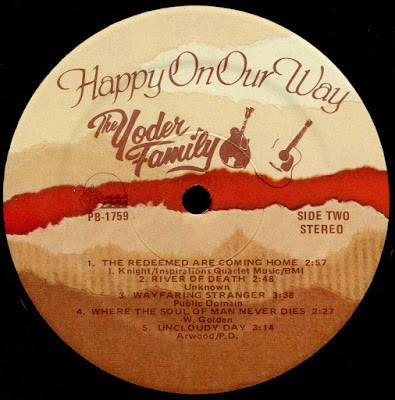I should win the Creative Blog Title of the Year award for "Don Richardson and others." Sorry for my long absence--the weather has had me demotivated. Something about snow (over ice) that just sits there and sits there (and sits there), with the temps refusing to climb above 32--it lowers one's blogging enthusiasm. However, major meltage is occurring now that we're finally at seasonal temps, and I might even be able to get to the top of my drive, say, today. I don't intend to attempt this until all (or nearly all) of the snow/ice is gone. The drive is 2/3 cleared, as we speak. A long, steep, curved rural drive can be a cool thing, but for the past two weeks and more, it's been anything but.
But we're here to talk early country music. In my previous post, I did a reading-too-fast error and listed Philip Hauser as the pianist behind fiddler Don Richardson's 1916 sides--in fact, it was Samuel Jospe on the 1916 discs (I corrected the post and mp3 tags). Hauser tickles the ivories on Don's 1921 sides, and, while making these posts, I discovered I wasn't as up on Don's discography as I imagined--he recorded six sides (three 78s) in 1916, and just as many in 1921, all for Columbia. Somehow, I wasn't aware of that, and maybe it's because the online 78 discography--the one I couldn't operate without--splits off at both 1917 and 1921 in the way it's sectioned. Sure, blame the online discography. Of course, that resource is wonderful and I'm epically thankful for it.
So, there are two 1921 Richardson sides I don't own, but I prefer ripping my own copies, as opposed to borrowing from the Internet Archive, so I hope to acquire these sides sometime. Nothing against using IA rips--I just like to start with my own, using no response curve for the acousticals, and then working from there. So... today, we have Don's two remaining 1916 gems--Mrs. McLeod's Reel and The Devil's Dream. Richardson is as amazing as ever on these two, and I wish my copy was in better shape, though The Devils Dream comes through loud and clear--it's a robust number. I'm sure there's much boring, er, much fascinating background on these tune titles, but don't look at me. And the 1921 Richardson titles are gems, and either Columbia was doing quieter pressings by then, or else the shellac mixture from that period has aged better--dunno.
Then we have the Victor Military Band with Virginia Reels, including one we just heard--only as "Miss McCloud's Reel"--plus "Pop Goes the Weasel," the music to which seems to have originated as a dance in the 19th century, though I don't know about the reel part. Money Musk, the flip, was a type of country dance--and before "country" meant, well, country--and was named after a village in Aberdeenshire, Scotland. Now you know. Fine sides. Then we have the Tennessee Ramblers, from 1931, doing a "banjo, fiddle and dialogue" version of Arkansas Traveler, which of course means cornball humor, and plenty of it--and at the lightning pace of the old Rowan & Martin's Laugh-In series. At the time, Laugh-In was treated like a new era in comedy, with the cast breaking the punchline sound barrier on a weekly basis, but it seems they were treading old ground. For a horrifying time, watch some reruns of that show and try to imagine that it was once regarded as hip.
Then we have Harry Yerkes' Jazarimba Orchestra, from 1918, hammering out Turkey in the Straw, which "introduces" (i.e., includes) Arkansas Traveler and The Preacher and the Bear, though the results don't sound remotely country. (Big surprise.) Next, from Maine, we have got Mellie Dunham playing contra dance music--contra dances being related to square dances (that's all I know). The "calls" are by Mr. N.A. Noble, because you were wondering. 1926 county, and I'm fascinated by any and all New England "roots" of a musical form we regard as southern. For example, there's that other early country fiddler, Charles Ross Taggart, "The Man from Vermont" (and who, sure enough, grew up there). He's not in this playlist, but he'd fit right in.
Back to 1905 for Charles D'Almaine's Medley of Old Time Reels, and as country as Charles may sound, we just know he isn't "authentic," if only because he was an accomplished musician--and from England. Sure, he was born close to the fiddle-tune source (the UK) and he sounds like the real deal, but of what value is "sounds like..." when we're talking about music? It's not as if music is an aural artform. (Wait--you mean, it is?)
So... eleven terrific tracks, and I didn't once give my opinion of modern country. You don't necessarily want to hear it.
On that cheery note...
DOWNLOAD: Don Richardson and others, 1905-1931
Irish Washerwoman/Wearing of the Green/Rakes of Mallow--Don Richardson, violin, Philip Hauser, Piano (Columbia A3424; 1921)
Dance Wid' a Gal, Hole in Her Stocking--SameMrs. McLeod's Reel--Don Richardson, violin, Samuel Jospe, piano (Columbia A2575; 1916)
The Devil's Dream--Reel--Same
Virginia Reels (Intro. Arkansas T., Preacher and the Bear)--Victor Military Band (Victor 18552; 1918)
Money Musk Nos. 1 and 2--Same
Arkansas Traveler (Banjo, Fiddle and Dialogue)--The Tennessee Ramblers, 1931 (Brunswick)
Turkey in the Straw (Inttro. Arkansas T., Preachers and the Bear)--Jazarimba Orch. (Columbia A2537; 1918)
Lady of the Lake (Contra Dance)--Mellie Dunham and His Orch., Speaker: Mr. N.A. Noble (Victor 19940; 1926)
Medley of Old Time Reels--Charles D'Almaine, Violin solo with orchestra (Victor 16393, 1905)
Mountain Rangers (Contra Dance)--Mellie Dunham and His Orch., Speaker: Mr. N.A. Noble (Victor 19940; 1926)
Lee

















